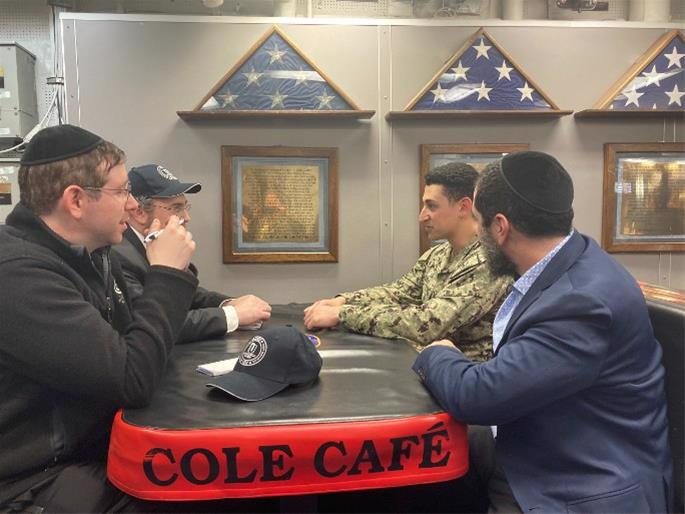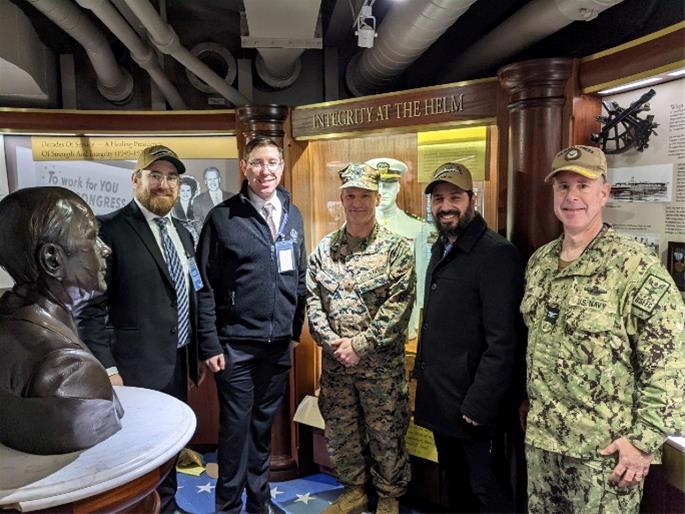When Petty Officer 2nd Class Daniel DiLiscia sets out this month for two years on the USS Nimitz aircraft carrier, the nuclear engineer and electrician is hopeful that his kosher-food experience will be better than it was during his first five years in the military. DiLiscia has endured long periods both on land and at sea, where he described himself as a “starving serviceman.”
When he deployed on the USS Roosevelt just before Chanukah, 2020, kosher MREs (Meals, Ready to Eat—shelf-stable, self-contained food rations) did not arrive on the ship.
“From Chanukah until Pesach, I ate salad with beans and tuna from cans. Your mouth goes numb. I started to look for kosher hot sauce to put on it. I worked 20 hours a day, was malnourished and lost 35 pounds.”
As Passover approached, and DiLiscia and his shipmates were in the South China Sea, he was gearing up for a holiday without matzah and other kosher provisions. “The kosher kits were stuck in Australia,” he laments. “Three hours before Pesach, a Pesach miracle occurred—boxes and boxes of matzah and other food arrived!”
Thanks to a recent collaboration between the Navy, Chabad, the Aleph Institute and the Orthodox Union, eating nutritious kosher meals daily will be much easier for Jewish sailors on many of the 280 Navy vessels, which include aircraft carriers, cruisers and destroyers.

New Agreements Cut Through Red Tape
While kosher food has technically been available for Jewish sailors for many years, sailors on board various naval vessels began sharing some of their frustrations and difficulties keeping kosher with Rabbi Elie Estrin, military personnel liaison for the Aleph Institute and editor of The Jewish-American Warrior.
“There was kosher food on ships before,” said Estrin. “The issue was how to provide each type of ship with a unique and workable system.” He points out that different types of ships have different systems, storage capacities and methods for restocking at sea, and that keeping kosher aboard a naval vessel involves complex logistics, including carefully scripted food menus, limited storage space and resupply opportunities, and strict fire-safety and food-handling measures necessary on the Navy’s ships. “We set out to bridge the gap and show the Navy that they have kosher food on board and that it is not difficult to solve.”
Standardizing New Systems With the Orthodox Union
After compiling feedback from kosher-observant sailors, Estrin patiently and systematically began to address the issues with the Navy in 2019. The process started with brainstorming sessions and phone conferences with the Navy’s senior Jewish chaplain, Cmdr. Aaron Kleinman, and a third individual, a Jewish Navy Supply Corps officer. They met with senior logistics officers who began studying the various problems and possibilities.
While these conversations did not resolve every issue, a significant breakthrough occurred when Rabbi Eli Eleff got involved. Eleff, rabbinic coordinator and community relations for OU Kosher—the world's largest kosher supervisory agency—began consulting with Aleph on questions regarding military chaplaincy. Estrin quickly realized that Eleff had both the food systems knowledge and the organizational impact of the OU to move the process forward. A team got to work.
Eleff worked closely with Kleinman, who was now stationed at Norfolk Naval Station in Virginia, and other senior Navy officials at Atlantic Fleet Force Command. Kleinman obtained permission for Eleff and senior OU kashrut supervisor Rabbi Daniel Sharratt to tour three ships docked at Norfolk Naval Base, including the aircraft carrier USS Gerald R. Ford, the amphibious assault vessel USS Bataan and the destroyer USS Cole. Chaplain Capt. Brian Stamm, Atlantic Fleet Force Command Chaplain, led the tour, accompanied by both Kleinman and Estrin.
“The professionalism of Rabbi Eleff and Rabbi Sharratt was incredible to observe,” says Estrin. “They clearly impressed the sailors, supply personnel and leadership of the ships with their understanding of food systems, clarity and sensitive investigative work, asking incisive questions and assessing the actual kosher possibilities from numerous angles.”
The work of the rabbis helped the Navy see that they were already on the road to providing a kosher experience to their sailors. The team found that 80% of dry foods and the fruits and vegetables used were already certified kosher or were inherently kosher.
In addition, it became clear to the senior Navy staff that complications arise when foods are prepared in kitchens that cannot be made kosher. The rabbis helped the Navy see that there were usually simple ways to allow sailors to enjoy three nutritious kosher meals each day aboard most Naval vessels—as long as there is good communication and clear explanations about the basics of kashrut.

A Comprehensive Report
Eleff and Sharratt next prepared a comprehensive report, which will be distributed to Naval supply officers, chaplains and Jewish sailors. It provides guidelines for requisitioning kosher supplies and how to use kosher meals on different classes of vessels.
Rabbi Menachem Genack, CEO of OU Kosher, commended the proactive approach of the U.S. Navy in recognizing the importance of accommodating kosher dietary requirements. “We appreciate the willingness of the U.S. Navy to work towards implementing a system for obtaining kosher food, demonstrating their commitment to inclusivity and religious freedom,” he said.
Rabbi Aaron Lipskar, CEO of the Aleph Institute, says he is pleased with his organization's role in helping meet Jewish service members’ needs. “Aleph is at the forefront of ensuring Jews who serve in the U.S. military are fully supported, materially and spiritually. This is a great win for Jews in the Navy, Coast Guard and Marine Corps, and it’s a great win for our country.”
DiLiscia is hopeful that his upcoming deployment will provide him with delicious and nutritious weekday, Sabbath and holiday foods. He will be at sea for Rosh Hashanah and Yom Kippur, where he will be leading the High Holiday prayers in addition to his electrician duties.
While DiLiscia is proud of his continuation of a family tradition of military service that goes back several generations, he says he relishes his time on land where he can daven and learn in person with Chabad. He says he takes his experiences with Chabad back on board, where he can influence other Jewish sailors.
“I hope my fellow sailors will have an easier time with it,” says DiLiscia. “A system to make kosher food available on board will transform not only our relationship with G‑d but also our professional relationships.”
“Everything they’ve done is appreciated not just in the abstract, but has improved my military experience practically,” he continues. “I am grateful that the U.S. Navy understands the desire of Jewish sailors to keep kosher and is willing to work to accommodate this basic element of Judaism.”




Start a Discussion